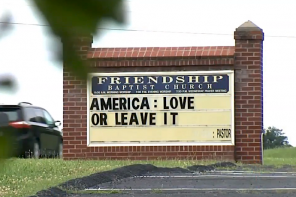In yesterday’s State of the Union address Barack Obama did what everyone expected him to do: He tried eloquently to fulfill his own admonition, offered two weeks earlier in Tucson, to speak “in a way that heals, not a way that wounds.” The tragedy itself, he explained, demanded what we have learned to call “civility”:
Tucson reminded us that… each of us is a part of… something more consequential than party or political preference. We are part of the American family… We share common hopes and a common creed… We can… we must… work together.
But he went further, making the newfound clamor for “civility” a mark of American exceptionalism: All American children share “the dreams of a little girl in Tucson”; all Americans believe that those dreams “deserve the chance to be fulfilled”; and that shared belief “sets us apart as a nation.”
As commentators quickly dubbed the president’s optimistic, future-oriented SOTU rhetoric “Reaganesque,” I thought of Garry Wills’ clever term for The Gipper’s version of American exceptionalism: “original sinlessness.” Obama seemed to be offering his own version: Other nations are racked by inescapable conflict, trapped in the endless echoes of age-old struggles; we are blessed by a unique ability—indeed destiny—to be free of conflict, to be free of the past, to “believe in the same dream that says this is a country where anything’s possible.”
Anything? Really? You can almost hear the pantheon of European Christian theologians groaning from their graves in disbelief.
But, hey, this is the New World where the frontier has traditionally offered the eternal lure of new beginnings and limitless wealth, even for the poorest-born. At the core of the American belief in social harmony is the myth of a classless society. Other nations are still caught in the snares of age-old class conflict while we have only the one great class: the middle.
That economic fiction has always gone hand-in-hand with the theological concept of “original sinlessness.” We bear no guilt because there has been, and still is, so little economic oppression (none at all, some have always maintained); we bear no burden of past strife because the past has been so harmonious.
Presidents have always been expected—indeed, for all practical political purposes obligated—to confess their faith in this economically-laden theology.
But we might expect something different from this president, the first to publicly acknowledge a close study of and allegiance to the work of Reinhold Niebuhr. Surely Mr. Obama understands “the irony of American history”—the way the fiction of “original sinlessness” leads us deeper into sin.
And indeed we got something different from Mr. Obama’s SOTU… sort of. Just before he affirmed that the spirit of “civility,” the solution to our dangerous dissention, is the mark of American exceptionalism, he also turned the problem itself—“the noise and passions and rancor of our public debate”—into a mark of exceptionalism. The “contentious debates” are “a good thing,” because “That’s what a robust democracy demands. That’s what helps set us apart as a nation.”
He reprised the theme later in the speech when he contrasted the American way (“We will argue about everything”) with countries that “don’t have this problem” because everything is controlled by the central government. “As contentious and frustrating and messy as our democracy can sometimes be, I know there isn’t a person here who would trade places with any other nation on Earth”—one of two lines in the speech that triggered the evening’s loudest and longest bursts of applause.
The president surely knows that Niebuhr endorsed the theory of democracy; not as an inherent harmony of interests, but as an endless contest of countervailing interests. In the SOTU, though, he gave us both views of democracy as proofs of American exceptionalism, as if there were no contradiction between them.
When he turned, relatively briefly, to foreign policy, Obama offered up a predictably more consistent Niebuhrian “realism.” He made his commitment to that view clear long ago, when he had to finesse the obvious embarrassment of accepting the Nobel Peace Prize while waging two wars: “Make no mistake: Evil does exist in the world… There will be times when nations… will find the use of force not only necessary but morally justified.” He repeated the first part of the syllogism in Tucson, giving it biblical warrant (“Scripture tells us that there is evil in the world”), though he decorously omitted the Niebuhrian corollary. After all, he was eulogizing Americans killed by the gun of an American.
In the SOTU all the guns were in the hands of the foreigners formerly known as “terrorists”: “Of course, as we speak, al Qaeda and their affiliates continue to plan attacks against us… try to inspire acts of violence within our borders… We have also taken the fight to al Qaeda and their allies abroad.”
“Of course,” as if it had become a trite cliché. The threat once portrayed as so formidable that nothing else in American life mattered was now dispensed with in a few brief sentences. Somehow the words no longer inspired the fear they did when deployed by the president’s predecessors.
Yet here too Obama linked an old Niebuhrian “realist” view—the world as an anarchic jungle, demanding constant defense against predators lurking everywhere—with American exceptionalism: “We must never forget that the things we’ve struggled for, and fought for, live in the hearts of people everywhere. And we must always remember that the Americans who have borne the greatest burden in this struggle are the men and women who serve our country.” And somehow they do it all without themselves incurring any moral stain, because they are Americans. Oh, as Niebuhr said, the irony.
Yet “who serve our country” was the only other huge applause line of the entire address. If the applause-o-meter in the House chamber were any judge, the heart of the matter is that, in the best Niebuhrian “realist” fashion, a “contentious and frustrating and messy democracy” is proving its superiority to every other nation with its domestic “civility,” while at the same time sending its military forces to fend off a shadowy and (let’s be honest now) apparently rather ineffectual foreign threat.
Whether the president truly believes his Niebuhrian rhetoric no one will ever know. But if he is deploying words merely to win political victories, he is proving himself just as much a disciple of Niebuhr, who assumed that every political leader would do the same.
What the great theologian did not foresee when he first baptized the ascendant political “realism” was that every president from FDR to Obama would go out to political battle armed with semi-Niebuhrian words, praising America as exceptional both because it is a sinless nation threatened by sinners (thus entitled to slay those sinners) and because it is mired in its own sin, yet uniquely able to transcend that and come together “civilly” in a domestic harmony of natural interests.
In sum, Obama’s SOTU was a deft combination of centuries-old American exceptionalism and a decades-old consensus that can best be called “semi-Niebuhrianism.”
“When a tragedy like this strikes,” Obama said in his Tucson speech, “it is part of our nature to demand explanations—to try to impose some order on the chaos, and make sense out of that which seems senseless.”
He might more accurately have said that it is part of American political culture to demand that the president impose order and make sense out of the senseless. Indeed that is ultimately the president’s highest task, the one on which (apart from the performance of the economy) his political fate rises or falls. And every president since FDR has carried out that rhetorical task with some variant of semi-Niebuhrian discourse, which is more than unfortunate, for the true irony of recent American history is that we are damned if we embrace the full import of Niebuhr’s doctrine of original sin and damned if—in the name of American exceptionalism—we don’t. (Just the kind of irony that Niebuhr himself would have relished.)
If we follow the Cold War-worn path of “realism” we have nothing to look forward to but endless violence and economic injustice. When George Kennan famously said that “Niebuhr is the father of us all,” the “us” he referred to was the small group of elite policymakers who brought us the hydrogen bomb and the Cuban missile crisis, the IMF and the World Bank, because (as the NSC-68, which essentially set the policy for the Cold War, put it), even if there were no communist threat, the world had to move toward “some kind of order, on somebody’s terms.”
Unfortunately Obama offers no way out of this tragic path. Though he should be thanked for wanting to wage the struggle with China in economic and not military terms, he ramped up that struggle in the SOTU, warning that the Chinese are outstripping us technologically and we must “win the future,” despite all the risk such belligerent talk entails. Perhaps a foreign policy Niebuhrian can be expected to do no less.
On the other hand, if we reject Niebuhr’s premise of endless conflict in the domestic as well as foreign realm, then we fall back into the fantasy of a classless society, which has served for so long to justify the perpetuation—and in recent decades the dramatic exacerbation—of economic inequity. The suffering is inflicted, as always, on the poorest Americans by the periodic “wringing out” of the economy. This time around it’s worse than usual. Yet it can still be easily dismissed when compromise with the stark injustices proposed by conservatives is applauded as “civility.”
Until American political discourse can rid itself of the pervasive shadow of Niebuhrian “realism” and explore new, non-exploitive ways to express its uniqueness and passion for moral virtue, we will continue to muddle along through the valley of the shadow of semi-Niebuhrianism and suffer all its perils. A semi-Niebuhrian president like Obama may accomplish some genuinely good things like health care reform or clean energy technology investment, and he will deserve our thanks for it. But he will not give us the new mythology we need to replace the public infatuation with semi-Niebuhrianism. That is up to us.




